New Genealogy Records and Updates
Here are the important system and records updates from industry leaders. Each new feature and record offers a new opportunity to learn more about your family history. Let’s get started!

MyHeritage Updates
MyHeritage announced an update their Related Records features on December 16, 2019. Here’s the latest from their blog:
“We recently revamped Related Records in SuperSearch™ to ensure that you don’t miss any important historical records that can lead you to new discoveries.
Related Records, previously known as Record Detective™, shows additional records or family tree profiles that might belong to the person or people featured in the historical record you are currently viewing.
The technology scans the record you’ve discovered in SuperSearch™ and matches it to our entire database of over 10.2 billion historical records and family tree profiles to locate related records.
For example, a birth record could point to a newspaper article about the wedding of the same person, where you could learn about new family members that you weren’t aware of.
To make Related Records more practical and ensure that you won’t miss them, we now show them in a convenient panel on the right-hand side of the record instead of below it.
Related Records are generated by MyHeritage’s record-to-record matching technology, and we’ve just re-calculated these matches, adding hundreds of millions of additional Related Records. This will open the door to many new and exciting discoveries.”
MyHeritage Records
MyHeritage has also been busy adding new records:
Germany, War Graves Index, 1902-1961
An index of 4,234,266 records
“This index of over 4.2 million records containing information on German soldiers and civilians who died in wars or military operations between 1902 and 1961.
Many of the records are for soldiers killed during World War I or World War II. While the amount of information in each record varies, the vast majority of records contain the following searchable data: first and last name, date of birth, date of death, and place of death. Some records also include birth place, burial place, and military rank.
The burial place is seldom recorded, but when available it can provide valuable information about the location of the grave.
While this is largely an early 20th-century military death index, many women are present in this collection.
In the case of soldiers who went missing, the date of death field may refer to the date on which they went missing. Similarly, the place of death may refer to the place from which they went missing.”
Australia, Military Lists and Awards
An index of Australian military rolls.
960,081 records
United States, Index of Burials, 1900-2019
An index of records from various cemeteries located in the United States.
492,002 records
Australia, Index of Burials, 1900-2019
An index of records from various cemeteries located in Australia.
438,587 records
England & Wales, Prerogative Court of Canterbury, Index of Will Registers, 1384-1858
An index of wills proved before the Prerogative Court of Canterbury and other jurisdictions.
979,653 records
United Kingdom, Royal Navy Ratings’ Service Records, 1853-1928
An index of Royal Navy service records for ratings who entered the service between 1853 and 1928.
803,684 records
United Kingdom, Registry of Shipping and Seamen: Royal Navy Reserve Ratings’ Records of Service, 1908-1958
An index of service record cards of Royal Naval Reserves, mainly those who served during the First World War.
129,896 records
United Kingdom, Royal Air Force Officers’ Index, 1918-1919
An index of service records of those who served in the Royal Air Force (RAF) during the First World War (1914–1918).
101,411 records
United Kingdom, Royal Marines’ Service Records, 1842-1925
An index of service registers of men who joined the Royal Marines between 1842 and 1925.
112,012 records
United Kingdom, Index of Merchant Seamen’s Campaign Medals, 1939-1945
An index of 108,387 records
United Kingdom, Index of Merchant Seamen’s Campaign Medals, 1914-1918
An index of recipients of British War Medals, Mercantile Marine Medals, and Silver War Badges issued to merchant seamen and officers in the First World War.
157,424 records
United Kingdom, Recommendations for Military Honours and Awards, 1935-1990
An index of recommendations for military honors and awards between 1935 and 1990 to British Army personnel and army personnel from British dominions.
78,497 records
United Kingdom, Royal Navy Officers’ Service Records, 1756-1931
An index of service records for officers who joined the Royal Navy between 1756 and 1931.
66,686 records
United Kingdom, Royal Navy Volunteer Reserve Index, 1903-1922
An index of First World War service records for officers and ratings of the Royal Naval Volunteer Reserve (RNVR).
59,784 records
United Kingdom, Index of Death Duty Registers, 1796-1811
An index of 51,146 records
United Kingdom, Admiralty and War Office: Royal Naval Division: Records of Service, 1914-1919
An index of service records of ratings and officers in the Royal Naval Division (RND) during the First World War.
50,017 records
Click here to search for these records at MyHeritage.
FamilySearch Records
FamilySearch has also continued to add indexed records. Most are to existing collections, but some are new collections. Here’s what they announced on December 9, 2019.
SALT LAKE CITY, UT—New, free, historical records were added to FamilySearch.org from American Samoa, Brazil, Chile, Colombia, Costa Rica, England, France, Ireland, Italy, Netherlands, New Zealand, Peru, Puerto Rico, South Africa, Venezuela and the United States. Over 800,000 records were added from the Cape Province of Africa (1895-1972.)
American Samoa
American Samoa, Vital Records, 1850-1972
3,550 indexed records
Added indexed records to an existing collection
Brazil
Brazil, Santa Catarina, Civil Registration, 1850-1999
8,512 indexed records
Added indexed records to an existing collection
Chile
Chile, Catholic Church Records, 1710-1928
7,707 indexed records
Added indexed records to an existing collection
Colombia
Colombia, Bogotá, Burial Permits, 1960-1991
79,631 indexed records
Added indexed records to an existing collection
Croatia
Croatia, Delnice Deanery Catholic Church Books, 1725-1926
2,870 indexed records
Added indexed records to an existing collection
Costa Rica
Costa Rica, Civil Registration, 1823-1975
151,856 indexed records
Added indexed records to an existing collection
England
England, Herefordshire Bishop’s Transcripts, 1583-1898
599 indexed records
Added indexed records to an existing collection
England, Huntingdonshire Parish Registers
52,367 indexed records
Added indexed records to an existing collection
England, Oxfordshire Parish Registers 1538-1904
51,159 indexed records
Added indexed records to an existing collection
England, Yorkshire Marriage Bonds and Allegations, 1613-1887
2,587 indexed records
Added indexed records to an existing collection
England, Cambridge Parish Registers, 1538-1983
468,063 indexed records
Added indexed records to an existing collection
France
France, Vienne, Military Draft Cards, 1867-1921
3,633 indexed records
Added indexed records to an existing collection
Ireland
Ireland, James Alexander Henderson, The Belfast and Province of Ulster Directory for 1856
37,363 indexed records
New indexed records collection
Ireland, Thom’s Irish Almanac & Official Directory 1868
103,355 indexed records
New indexed records collection
Northern Ireland, Tithe Applotment Books, 1822-1837
175,575 indexed records
New indexed records collection
Ireland and Britain, Transatlantic Migration from North America, 1858-1870
42,695 indexed records
New indexed records collection
Ireland, Thom’s Official Directory of the United Kingdom of Great Britain and Ireland, 1894, Irish Section
121,181 indexed records
New indexed records collection
Ireland, Thom’s Official Directory, 1910
131,734 indexed records
New indexed records collection
Italy
Italy, Trieste, Civil Registration (State Archive), 1924-1944
100 indexed records
New indexed records collection
Netherlands
Netherlands, Archival Indexes, Vital Records, 1600-2000
101,765 indexed records (over several weeks)
Added indexed records to an existing collection
New Zealand
New Zealand, Archives New Zealand, Probate Records, 1843-1998
637 indexed records
Added indexed records to an existing collection
Peru
Peru, Amazonas, Civil Registration, 1935-1999
26,959 indexed records
Added indexed records to an existing collection
Peru, Ayacucho, Civil Registration, 1903-1999
1,394 indexed records
Added indexed records to an existing collection
Peru, Huánuco, Civil Registration, 1889-1997
23,227 indexed records
Added indexed records to an existing collection
Peru, Prelature of Yauyos-Cañete-Huarochirí, Catholic Church Records, 1665-2018
1,494 indexed records
Added indexed records to an existing collection
Peru, Tacna, Civil Registration, 1850-1998
193,495 indexed records
Added indexed records to an existing collection
Puerto Rico
Puerto Rico, Civil Registration, 1805-2001
714 indexed records
Added indexed records to an existing collection
South Africa
South Africa, Cape Province, Civil Deaths, 1895-1972
818,292 indexed records
Added indexed records to an existing collection
United States
Alabama
Alabama, Confederate Pension Applications, ca. 1880-1930’s
168,372 indexed records
Added indexed records to an existing collection
Alabama, County Birth Registers, 1881-1930
8,206 indexed records
Added indexed records to an existing collection
Arkansas
Arkansas Confederate Pensions, 1901-1929
96,713 indexed records
Added indexed records to an existing collection
California, San Francisco Arrivals
United States, California, List of United States Citizens Arriving at San Francisco, 1930-1949
434,995 indexed records
New indexed records collection
Georgia
Georgia, Chatham, Savannah, Laurel Grove Cemetery Record Keeper’s Book (colored), 1852-1942
24,094 indexed records
New indexed records collection
Georgia, Columbus, Linwood and Porterdale Colored Cemeteries, Interment Records, 1866-2000
28,946 indexed records
New indexed records collection
Georgia, County Delayed Birth and Death Records, 1870-1960
202 indexed records
Added indexed records to an existing collection
Hawaii
Hawaii, Board of Health, Marriage Record Indexes, 1909-1989
85,716 indexed records
Added indexed records to an existing collection
Hawaii, Hansen’s Disease Records, Kalaupapa Census Index, 1839-1970
2,336 indexed records
Added indexed records to an existing collection
Louisiana
Louisiana, New Orleans, Interment Registers, 1836-1972
133,660 indexed records
Added indexed records to an existing collection
Louisiana, Orleans Parish, Birth Records, 1819-1906
85,840 indexed records
Added indexed records to an existing collection
Louisiana, New Orleans Index to Passenger Lists, 1853-1952
151,894 indexed records
New indexed records collection
South Carolina
South Carolina, Charleston County, Charleston, Birth Registers, 1901-1926
14,132 indexed records
Added indexed records to an existing collection
Tennessee
Tennessee, Davidson County, Nashville City Cemetery Records, 1843-1962
18,187 indexed records
New indexed records collection
Tennessee, Shelby County, Memphis, Board of Health Death Records, 1848-1913
1,121 indexed records
Added indexed records to an existing collection
Texas
Texas, Harrison County Delayed Birth Records, 1860-1933
23 indexed records
Added indexed records to an existing collection
U.S. Obituaries
United States, GenealogyBank Historical Newspaper Obituaries, 1815-2011
8,829,622 indexed records
Added indexed records to an existing collection
Venezuela
Venezuela, Catholic Church Records, 1577-1995
109,788 indexed records
Added indexed records to an existing collection
FamilySearch Update
Also recently announced by FamilySearch:
FamilySearch Adds Ability to Document All Family Relationships
SALT LAKE CITY, UT (10 December 2019)
“The FamilySearch Family Tree now provides the ability for users to document all family relationships, including same-sex relationships.”
(FamilySearch) “encourages genealogical accuracy based on original source records and contains over a billion user-contributed lineage-linked records. Patrons are now able to document same-sex relationships, including same-sex marriages and same-sex adoptions.”
“When adding a spouse or parent to the FamilySearch Family Tree, the user can now add a spouse or parent of the same sex. The Family Tree mobile app will also support this new capacity after users install the necessary updates.”
Official Statement from The Church of Jesus Christ of Latter-day Saints
Ancestry Record Updates
Here are the latest new and updated historical genealogy records from Ancestry:
Updated:
Australia and New Zealand, Find A Grave Index, 1800s-Current
Updated:
U.S., Find A Grave Index, 1600s-Current
Updated:
Brazil, Find A Grave Index, 1800s-Current
New:
New York State, Card Index to Supreme Court and Court of Chancery Documents, 1648-1848
New:
Milwaukee, Wisconsin, Marriages, 1838-1911
New:
Milwaukee, Wisconsin, Births, 1839-1911
New:
Milwaukee, Wisconsin, Deaths, 1854-1911
Updated:
Norway, Find A Grave Index, 1800s-Current
Updated:
Sweden, Find A Grave Index, 1800s-Current
Updated:
Italy, Find A Grave Index, 1800s-Current
Sacramental Records Now Searchable Online in New and Updated Genealogical Records
Special thanks to the New England Historic Genealogical Society and the Archdiocese of Boston for their effort to make Sacramental records for genealogy available online. These and other new and updated genealogical collections are mentioned in this weeks list from the United States, Ireland, United Kingdom, Italy, and free record searches at Findmypast!
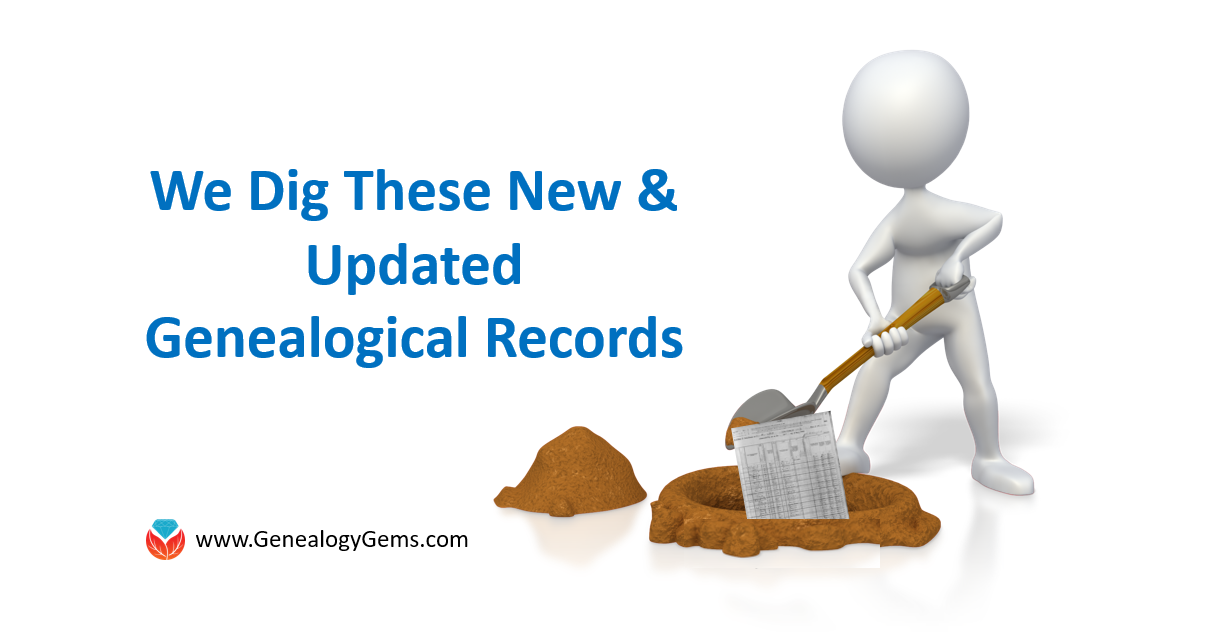
United States (New England area) & Canada – Sacramental Records for Genealogy
NEHGS has announced the New England Historic Genealogical Society (NEHGS) and Archdiocese of Boston have made millions of 18th and 19th century sacramental records searchable online.
United States – Oklahoma- Vital Records
Ok2Explore is a free searchable index of births and deaths that occurred in the state of Oklahoma. Only limited information is available for births occurring more than 20 years ago and deaths occurring more than 5 years ago.
Visitors to the site may search the index using any combination of the subject’s name, date of event (birth or death,) county of event, and sex of the subject.
Remember this is only an index version of the record, but you can order certified copies for a fee.
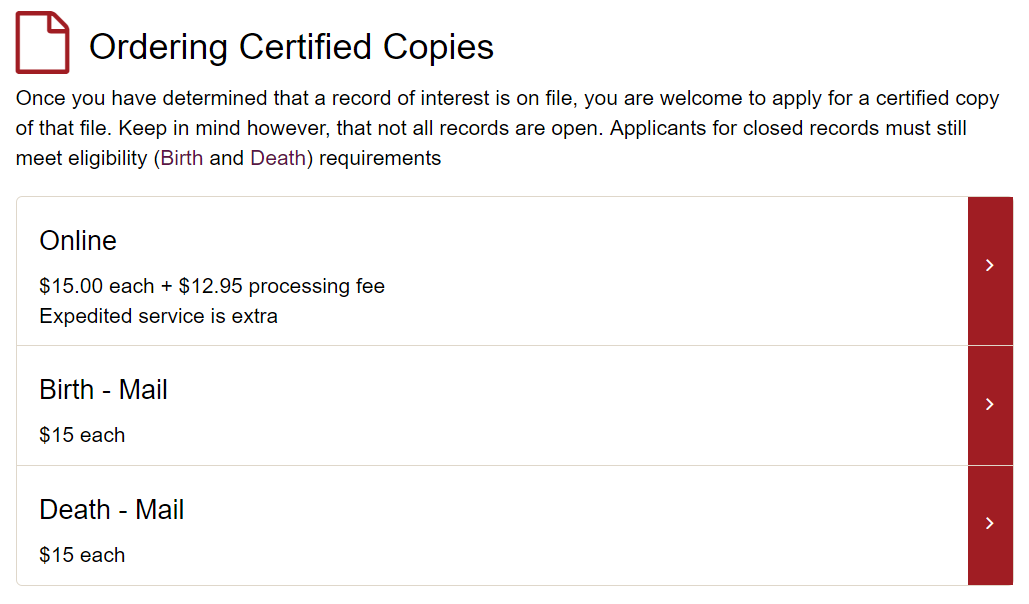
Ireland – Petty Sessions
New and updated genealogical collections this week include the Ireland, Petty Sessions Court Registers at Findmypast.
With over 227,700 new records, the petty sessions handled the bulk of lesser criminal and civil legal proceedings in Ireland. Ireland, Petty Sessions Court Registers now contains over 22.8 million records and is the largest collection of Irish court & prison records available anywhere online. Each record includes a transcript and a scanned image of the original document. These documents will include details of victims, witnesses and the accused, such as an address, date in court, details of the offence, details of the verdict, and the sentence.
Cases range from merchants who had not paid duty on their goods, to workers suing for unpaid wages. Farmers were sometimes fined for letting their cattle wander or for allowing their cart to be driven without their name painted on the side. Public drunkenness was a common offence, as was assault and general rowdiness. Though these records are not considered typical for finding vital information, they can work as great clues to lead you to the information you need.
United Kingdom – Dorset – Memorial Inscriptions
The Dorset Memorial Inscriptions collection at Findmypast contains over 40,000 new records. The collection contains details of inscriptions found on gravestones, tombs, monuments and even stained glass windows throughout 266 parishes within English county.
Each record includes a transcript. The information contained varies, however, most will include a combination of birth year, death year, burial date and location, relative’s names, memorial type and notes on the inscription.
United Kingdom – Warwickshire – Burials
Also at Findmypast, over 175,000 new records have been added to the Warwickshire Burials. The entire collection now contains more 1 million records and includes monumental inscriptions from Clifton Road Cemetery in Rugby.
Each record includes a transcript of the original burial registry or details from the monumental inscription. While the information listed will vary depending on the records original source, most will include your ancestor’s name, age, birth year, death date, burial year, burial location and the name of the officiating minister. A number of records will also include parent’s names and residence. Inscriptions will include information recorded on the individual’s grave stone and will usually include the name of the individual’s spouse, children and/or parents. Also, some grave sites may have more than one person buried in the same plot.
United Kingdom – Northumberland & Durham – Monumental Inscriptions
Over 16,000 records for the Northumberland & Durham Monumental Inscriptions at Findmypast are now available. These include the full description found on a grave stone or monument which will often include additional family names and dates.
Each record includes a transcript of the original source material. The amount of information may vary due to the age and legibility of individual monuments, but most records will include birth date, burial year, burial place, death date, denomination, inscription, and even the type of stone their monument was made from.
Ireland – Quaker Congregational Records
Also at Findmypast, Ireland, Society Of Friends (Quaker) Congregational Records has been updated with an additional 5,000 congregational records. Congregational records include details of the meetings your ancestor’s attended and the activities they engaged in. This is a nice way to enrich your family story.
These records, dating back to the mid-1600s, include minutes from half-yearly Quaker meetings. Each entry includes an image of the original handwritten record. The information included will vary, but most will include the congregation date, address, meeting, archive and reference.
MyHeritage Year End Review
MyHeritage had some pretty exciting things going on in 2016. In their recent blog post, “A Look Back at 2016,” you will see the list including the MyHeritage mobile app, the introduction of Tribal Quest, the debut of the beautiful Sun Chart, and their recent announcement of MyHeritage DNA, just to name a few. Visit the blog post to see the MyHeritage year-in-review for yourself!
Venezuela – Australia – El Salvador – Philippines – Netherlands – Canada – Spain – Slovenia – U. S. – Italy
FamilySearch.org took a short break over the holidays from updating their collections, but with the start of the new year, they have added and updated over 20 collections from all over the world! Check out these great records:
Free Record Searches at Findmypast
Findmypast is offering a free records search weekend from January 12 – 15th, 2017. Don’t miss this amazing opportunity!
For records in the United Kingdom, click here.
For records in the US, click here.
For records in Ireland, click here.
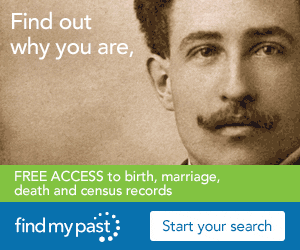
Finally, a comprehensive way to learn how to research your Irish Genealogy
This multimedia kit is a comprehensive and exciting way to learn to trace your Irish genealogy. Priced at just for EVERYTHING, you save nearly 0 on retail for a limited 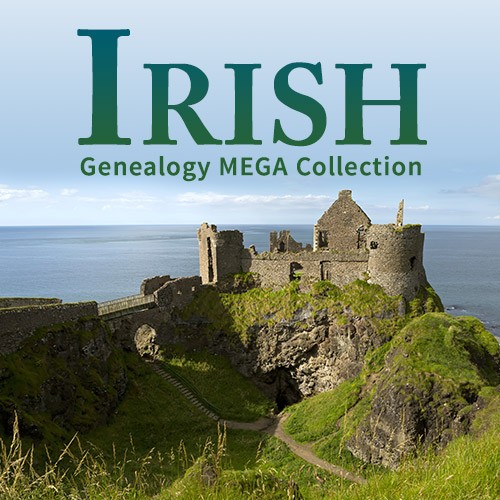 time, it’s a lucky deal, if I ever saw one!
time, it’s a lucky deal, if I ever saw one!
Tracing your Irish roots takes a bit of luck and a lot of patience. But the payoff for those who persist can be huge. The Irish have a rich history and culture that descendants love to embrace. And it’s getting more exciting to be an online Irish researcher, with important new Irish records coming online frequently.
One of the biggest Irish genealogy challenges is the destruction of the Public Records Office during the Irish Civil War. But while many records were lost, there are plenty of ways to find information on your ancestors.
Even better, during March Family Tree Magazine has slashed the price of its Irish Genealogy MEGA Collection. This comprehensive multimedia collection is a family historian’s pot of gold, packed with everything from tips on breaking down your Irish brick walls to finding vital and census records, immigration forms, and a thorough list of useful websites. Plus, you’ll get the historical background that drove emigration and affected your ancestors’ lives – as well as your research.
Here are the incredible tools you will get:
- EIGHT on-demand webinars on different aspects of Irish research
- A full-length e-book, A Genealogist’s Guide to Tracing Your Irish Ancestors
- A digital cheat sheet and an overview article for quick reference.
I love this multimedia kit because you can read, watch and learn at your own pace. The digital 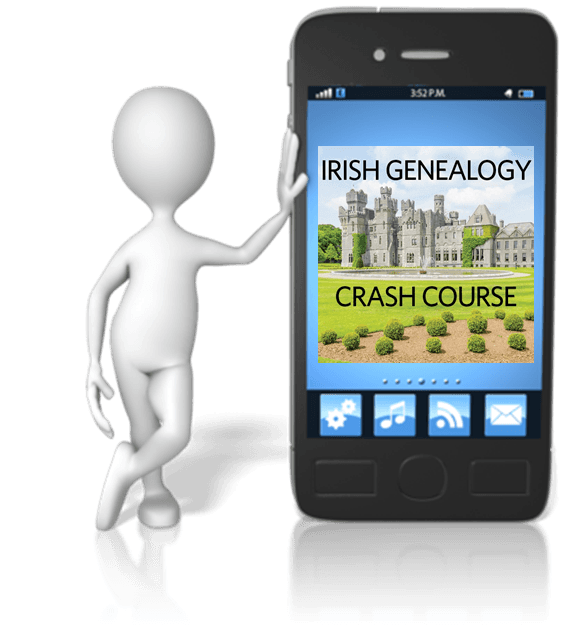 format means you can put the entire kit on your favorite mobile device. That lets you learn on-the-go and consult your reference library while you’re out researching. Of course you can use these materials on your home computer, too. The choice is yours–and with the limited-time price on this mega kit, the fabled luck of the Irish is yours, too!
format means you can put the entire kit on your favorite mobile device. That lets you learn on-the-go and consult your reference library while you’re out researching. Of course you can use these materials on your home computer, too. The choice is yours–and with the limited-time price on this mega kit, the fabled luck of the Irish is yours, too!
More Irish Genealogy Gems
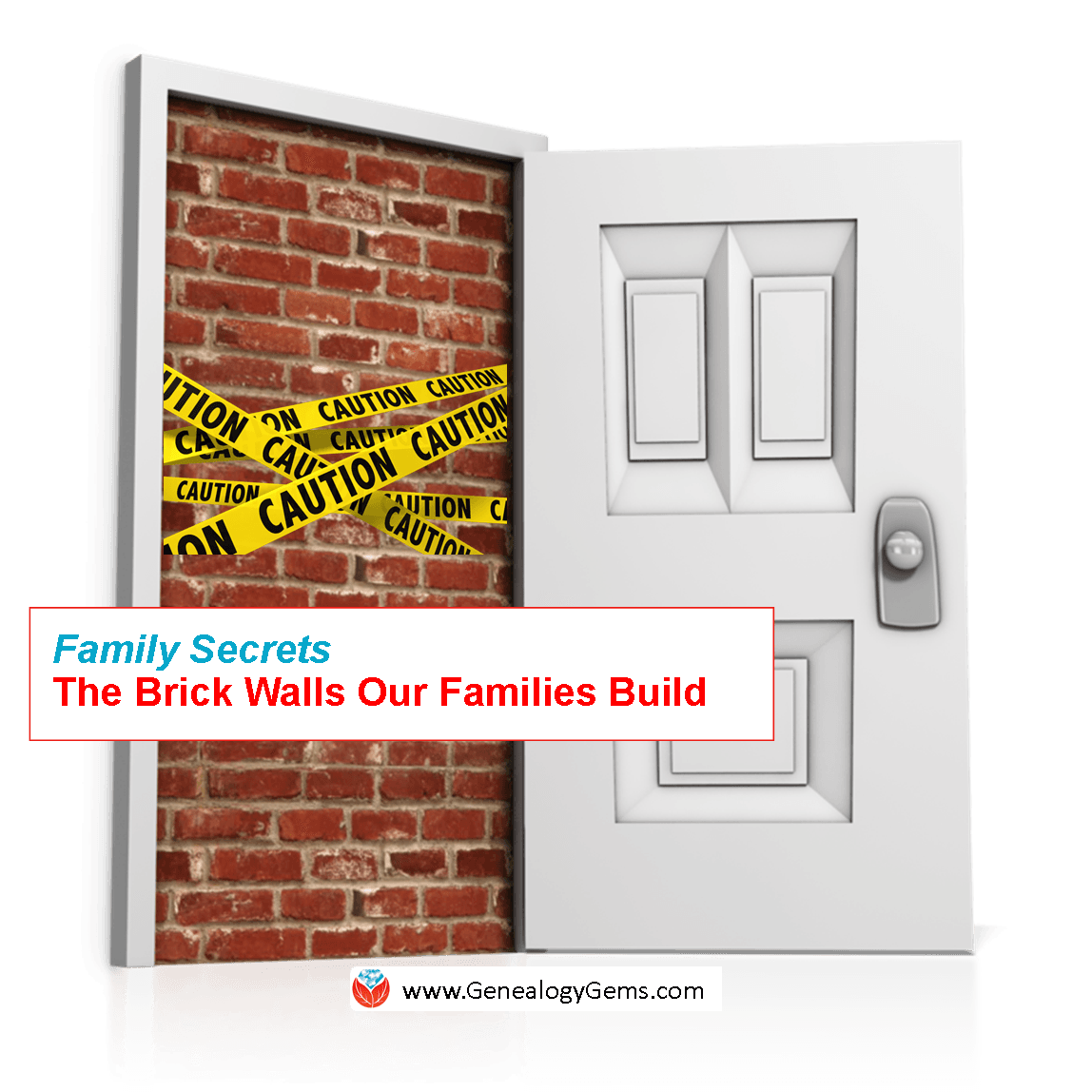 Beginning Irish Genealogy: Free Tips and Records
Beginning Irish Genealogy: Free Tips and Records- Irish History Book for Irish-Americans
- An Irish Adoption Secret–and a Helpful Resource
A Call to Reopen the U.S. National Archives
Video and Show Notes
On their website, the U.S. National Archives states their mission is to: “provide public access to Federal Government records in our custody and control. Public access to government records strengthens democracy by allowing Americans to claim their rights of citizenship, hold their government accountable, and understand their history so they can participate more effectively in their government.” (Source: https://www.archives.gov/about/history/about/history/history-and-mission)
Shockingly, as of February 2022 the archives has not been fulfilling that mission for nearly two years! (Source: Visit each facility web page listed at https://www.archives.gov/locations)
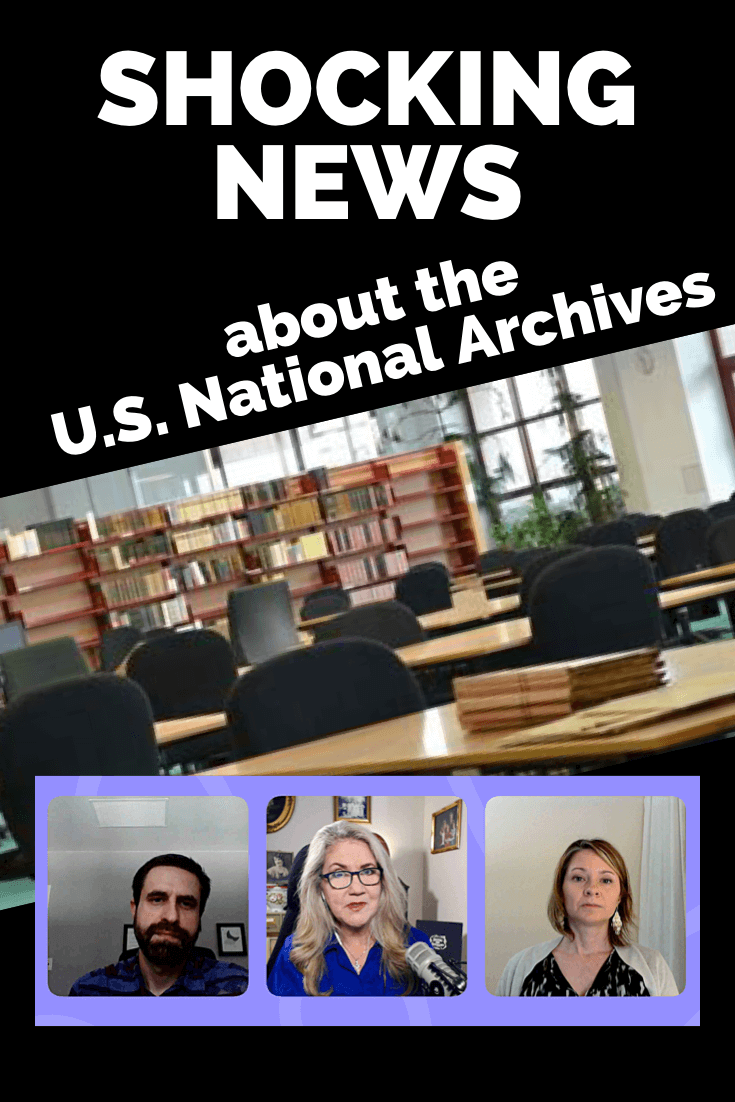
Please share and help get the word out.
My guests Geoff Gentilini, President of the Archival Researchers Association, and Jessica Taylor president of the international genealogy research firm, Legacy Tree Genealogists explain:
- more about the situation,
- its far-reaching impact,
- and what you can do to help.
Please make time to watch this important video and support the genealogy community! Sign the Petition: Two Years is Too Long: Reopen National Archives Research Rooms
Watch the Video
Having trouble viewing the live video or video replay? Try refreshing this page in your web browser.
Show Notes
(Premium Members: Log in and download the ad-free show notes handout.)
Geoff Gentilini is the president of the Archival Researchers Association. He is a professional researcher specializing in military records, individual veteran searches, unit histories, and family history research. He is the owner and project manager of Golden Arrow Research. In 2011, Geoff devised a unique process to rebuild the service histories of individual WWI, WW2 & Korean War veterans whose personnel records were lost in the 1973 archives fire. His work has enabled thousands of descendants to gain a better understanding of their ancestors’ military service. He is the president of the Archival Researchers Association, an organization that has been instrumental in advocating (to Congress) for an increase in the budget of the National Archives.
Jessica M. Taylor serves as president of international genealogy research firm, Legacy Tree Genealogists, and as a board member for the Association of Professional Genealogists, the Genealogy Business Alliance, and the Association of Genealogy Educators and Schools. With a degree in Family History – Genealogy and over 20 years of experience, Jessica loves contributing to the genealogy community and pushing the industry forward to better help others discover their roots.
The Scope of the Records at the National Archives
Lisa: Can you give our audience a quick overview of the scope of the records that are housed at the National Archives?
Geoff: There are about 46 facilities, including 15, presidential libraries, 14 archives, 17, federal record centers, and these are spread out across the country. They contain more than 13 billion textual records, 20 million photographs, 40 million aerial images, there’s 75,000 miles of film. These records tell our national story. The holdings are massive.
Today, something like 1% of this material is online. Researchers access the other 99% of these records in our nation’s public research rooms, which are scattered across the country.
I think the National Archives has the goal of digitizing somewhere near 3% of these records by the year 2024. But as we all know, just because something is digitized, that doesn’t necessarily mean that it’s going to be online or usable for research.
Jessica: The first time he said, you know, 99% of the records are digitized, I said “no way, there’s no way that that could be true.” So he sent me information that’s put up by the archives, and I did the math. And I said, “Holy cow, you know, it’s absolutely true.” There are records there that you can’t get any other way, besides going in person to get those records.
Research Rooms
Lisa: I did an entire hour show on the National Archives website last year, and it got on my radar as well, that as wonderful as the site is, and it’s got some access to some things, it’s such a tiny fraction! This means there’s a treasure trove remaining, but you have to access it in person.
(How to Search the U.S. National Archives Online Catalog for Genealogy with Lisa Louise Cooke.)
Jessica, that leads us to the research rooms because that’s where we gain access to the records. What and where are the research rooms? And who uses them?
Researchers
Jessica: There are 14 National Archives research rooms spread around the country. Washington, DC has a major one. There’s one nearby in College Park, Texas, a few on the West Coast, one in Missouri. So they’re spread out throughout the country.
Each one of these research rooms has different records. So, like we said, they’re all paper still, and in different facilities. If you want a certain type of record, you have to go to that facility to get it.
The people who use these research rooms are obviously genealogists, that’s my primary interest in them, historians, authors, filmmakers, and lots of use for veterans. There are educators, students, I mean, there are so many groups who need these records and have been on hold.
I have a friend who is working on a book that she’s had to put on hold for two years because she needs the information that’s in one of the archives. She can’t complete the book until the archives opens.
The Impact of the Research Rooms Closures
Lisa: Geoff, I know that you work a lot at the National Archives in St. Louis, can you explain to our audience the significance of that particular location, and its closure, and particularly on veterans? How are they affected?
Geoff: The Research Room in St. Louis is really special because it contains the personnel records and military records that tell the story of the men and women who served in the armed forces. These are records from World War I, World War II, the Korean War all the way up through Vietnam, and later.
Many living veterans and veterans’ advocates rely on researchers to work on these more complex research cases. They help to reverse denied benefits claims in many cases. This type of work has been stalled for two years!
From the historical record side of things, this is the work that I used to do primarily in St. Louis. I would rebuild the service histories, the individuals whose records were lost in the 1973 fire, primarily veterans of World War II but also World War I, and the Korean War. Families who really knew nothing about their loved ones service could gain closure by understanding their contribution to the war effort.
This research in St. Louis also helps to do things like correct grave markers for veterans and locate the remains of fallen soldiers who were lost on the battlefield.
At this point, there hasn’t even been a minimal reopening in St. Louis, the way that there was at some other research locations.
Lisa: You’re talking about veteran records. I imagine that people are trying to verify benefits. Don’t you guys work with people who volunteer to help veterans get the records they need so that they can apply for their benefits or is that stalled?
Geoff: Yeah. There is a massive backlog right now of requests that come in from veterans and their families for DD 214 records. These are like the military discharges that you can use to when you’re seeking benefits to get a home loan and things like that. What has happened is that the historical research portion of the archives there has not been reopened, because of that enormous backlog. But at this point, it’s been two years, and they’ve sort of locked the doors. But that that backlog is still growing. The St. Louis Research Room is also a smaller Research Room, and we believe it can be reopened by leaving a smaller footprint.
Lisa: Jessica, can you give us a sense of the financial impact of these closings on the people who rely on access to the research rooms for their work?
Jessica: When when COVID first hit in 2020, and they were closed, that’s the time period when I got in contact with Geoff. What drew me to trying to help his organization initially was people like Geoff who are completely out of work. Their businesses revolve around access to archives, to the National Archives, to specific facilities in specific regions. And so, I thought, wow, I’ve got to help them be able to work again, right?
So we’ve tried and now two years have gone by, and I just can’t imagine how these people are faring. Because they’ve been out of work for two years. I just talked with somebody on LinkedIn who reached out about this petition, and he was so thankful that we have this petition and said, “Well, I’ve been so frustrated. I was actually told, you know, shame on me for building my business model around relying on the National Archives.” And I thought wow, how sad that we can’t rely on the National Archives to open. It just hurts my heart. I mean, beyond that, there is this author I mentioned who is trying to finish her book can’t finish it. It’s been two years!
And of course, we have many clients who have ordered genealogical research that we can’t finish. Many have asked for refunds, because two years is a long time to wait for something like this. So unfortunately, it definitely has had an impact in the genealogy industry and other industries as well.
Geoff: The work that we do is important work. It’s specialized skills, too. And after two years, we’re starting to see our colleagues quit and move on to other things, because how long can you sustain yourself without being able to access these records that enable you to do your job? So that that’s something else too. It’s a loss for the public. We’re losing the expertise and the people that help to tell these stories by accessing these records.
Will the National Archives Reopen?
Lisa: Let’s talk about the reopening because right now, we’ve looked at two full years of closure and lack of access. I was doing some research in anticipation of getting together and talking today and I was looking at what the National Archives is saying about their policy and what they call high, medium and low risk. Even if the risk is considered low, they’re not saying full reopening. They’re talking about appointments and screenings and things.
I know that David S. Ferriero, Archivist of the United States, put out a letter, the most recent one I could find was November 8 of 2021. He says “at low transmission level staff will be on site to complete all types of work, and research rooms are expected to remain open by appointment only.”
Geoff, does that sound like an organization that’s planning on and anxious to get back to full time access?
Geoff: Yes, well, it certainly sounds like a difficult system for someone who would need to be able to do their job five days a week and get in there and really access these records in the way that we need to, to do our jobs. We really are trying to look past that. The restrictions, until we can get back to a level of normalcy, at least in the level of access to records, the sliding scale system with the case rates, and how they open and close. This appears to be how the federal government has structured things for the agencies that fall underneath of the executive branch, the IRS, and the Social Security Administration. Some of this is out of the hands of the archives management.
Other things we think they might be able to do when they do open to kind of prioritize the research rooms and get them back to functioning at pre pandemic levels. That’s really what we’re seeking. We kind of feel like where there’s a will there’s a way. And when 99% of the records that you work with are physical, it really demands that you have the staff and be open to meet that public demand.
Lisa: I noticed on the petition website, which we are going to talk about, there is a way that our viewers can help try to get the message forward to those in power to make a different decision and maybe open this up.
One of the things that’s interesting is that the museum in the Washington DC area is open. It’s in the same building as the research rooms, and those are closed.
Geoff, have they told you anything about ‘here’s the mark, here’s the goalpost? When this happens, we will welcome you all back.’ Do you have any sense of what that place is?
Geoff: I think that the pandemic has been so unpredictable that no one is willing to make any type of you know, there’s no clarity. Everyone is sort of seeking cover. And in this hyper partisan environment that we live in today, nobody’s willing to kind of stick their neck out and say, ‘Well, this is what we’re going to do to take initiative, be imaginative.’ And that’s really what we need so that we can function in a type of new normal when it comes to research.
We know that we’ve got vaccines – 95% of the federal workforce is vaccinated. I believe that you have to either show proof of vaccination status to get inside of the archives or show that you’ve had a negative test. And then of course, you’re required to wear a mask. So, there are things in place to make sure that we have a safe environment when we’re researching. So, the public is safe, and the staff are safe. We just need to figure out how to get back to pre-pandemic levels of access, even if we do have some new restrictions in place, like masks or vaccines or things like that.
Jessica: Geoff mentioned to access the archives, showing that you’re vaccinated, using a mask. So that was in place during the couple of weeks that two of the archives were actually opened in November. We had two archives opened for a couple of weeks, in November. And we did follow all of those protocols. However, they were closed, and the other facilities around the country have never opened since March 2020.
Lisa: And of course, since then, with the coming up Omicron, we know that the vaccinated get ill just like the unvaccinated. So, you’re right, it keeps changing and keeps moving. And that’s where the lack of the goalpost is kind of a challenge.
Let’s talk about some of the ways you’re trying to communicate with the National Archives to see what could be resolved so that everybody feels good about what’s happening and can participate and get what they need.
How You Can Make a Difference in the Reopening
Jessica, you’ve put a petition together. This is what first came to my attention. Tell us about what that is and what your goals are.
Jessica: Absolutely. A main goal that I have with this petition is I just thought ‘I can’t let over two years go by with these important archives being closed, and the leaders of the archives not receive a united strong message from our communities that we care about this, and that it affects us.’ So a major goal is I just want to be able to show them how many people care that they’re closed, especially because it affects us not only now, but genealogists and historians have a long history of having to fight for public access to records.
I don’t want those leaders to look back on this event, years into the future and think ‘well, nobody really seemed to mind that they couldn’t access those records.’ I want them to know that many, many thousands of people cared that they couldn’t access the records.
The ask of this petition is that they reopen by sometime in March 2022. That will be a full two years that many of these facilities have been closed. We’ve seen many other events and businesses and groups have been able to safely reopen, I think that the National Archives is capable of doing the same. I think that it’s important that we ask for that strongly and in the united fashion.
The petition is at https://change.org/reopen archives. We want thousands of signatures. We have about 3000. We’d like to at least double that. We want them to know that these archives matter to the citizens of the United States and the world.
The Petition: Two Years is Too Long: Reopen National Archives Research Rooms
Lisa: I wholeheartedly agree. And I know you’ve just had it up a couple of days, and that’s an amazing start right out of the gate.
As you said, there’s a lot of different players involved who make the decisions, but it’s so important that we make our voice known and our needs known because how else would they incorporate that into the decision-making?
Anything else Geoff that you want to mention about this and things that you would encourage people to do?
Geoff: Something else folks might think about doing is reaching out to your house representative to your senators and just letting them know that you care about this issue that you want to see the archives open all the research rooms back open again. Citizens need and deserve access to government records. That’s the archives mission.
Lisa: it certainly is, and I really appreciate and respect that the two of you have taken some action and made your voices known and hopefully we will ask everybody here watching to help do the same.
Jessica: And please share, you share it, sign it and also share!
Lisa: Yes, That’s the best way to get the word out. Everybody knows another genealogist!
Resources
Premium Members: Log in and download the ad-free show notes handout.
